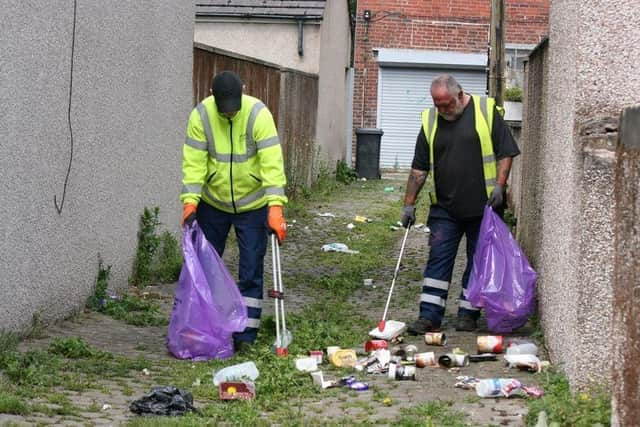Crime scene tape will be used to tackle fly-tipping in Lancaster and Morecambe
and live on Freeview channel 276
Over recent weeks, Lancaster City Council has been using various shock tactic methods, along with more traditional leaflets and community meetings, to hammer home messages that fly-tipping is illegal, damaging and costly.
Test measures by council fly-tipping crews using stencil messages are being run in Poulton and Harbour wards, while crime scene tape is being used in the Harbour, Overton and Skerton East and West wards.
Advertisement
Hide AdAdvertisement
Hide AdMorecambe Labour councillor David Whitaker and others highlighted the problem of fly-tipping at the latest city council meeting and councillors agreed a motion calling for regular update reports on the new high-profile measures and other activity.


The new measures are linked to a partnership between the city council and the Keep Britain Tidy charity.
Key elements include:
Placing high-visibility ‘crime scene’ tape and stickers on fly tips and leaving them for three days before removal.Putting social impact stencilled messages on walls or streets where fly tipping has been cleared. Messages highlight the cost spent on clearing fly tipping, and emphasise that dumped waste has not magically ‘disappeared’.Developing a ‘no waste on streets’ system where special containers are used on high streets to keep all bagged waste off streets or pavements until the time of collection. This could cover commercial waste from shops and businesses. Waste currently left in bags on streets for collection can still attract illegal fly-tipping, a report to councillors stated.
Coun Whitaker and others said city council fly-tipping crews already provided a good response and there was no criticism of them, However, the problem was relentless and the new measures were needed.
Advertisement
Hide AdAdvertisement
Hide AdCoun Whitaker said: “Fly-tipping is a repetitive problem and the number one complaint that councillors get in areas such as Morecambe’s West End.
"It also affects rural areas. It impacts on people’s well-being and there’s nothing worse than coming out of your house or flat to find rubbish left on the street.
"There are many factors and problems, such as deprivation and collection costs to dispose of things properly. Also some people do not understand the consequences of fly-tipping.”
He said putting messages on walls or pavements using stencils was being tested. This uses a chalk-based paint or markings which wash away with water over time.
Advertisement
Hide AdAdvertisement
Hide AdHe added: “This needs to be community-led with awareness days, information and work with schools and businesses. People need to be clear about what days waste collections happen and we need to build a message about no rubbish left on streets.”
Conservatives supported the new measures and the call for regular update reports.
Coun Richard Austin-Baker said: “I really welcome this. Fly-tipping can be a big problem in rural areas too. It’s horrible to see building waste often disposed in fields and woods.”
However, Labour councillor Phillip Black said: “I think we might need to bring a bit of compassion to some people. There is a broader picture. Littering is not just caused by anti-social behaviour. It’s not a coincidence that fly-tipping is a problem in some more deprived wards.”
Advertisement
Hide AdAdvertisement
Hide AdCouncillors backed a motion calling for regular update reports on the impact of the stencil messages and all other initiatives to reduce fly tipping.